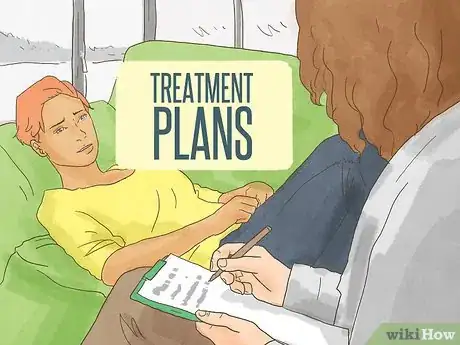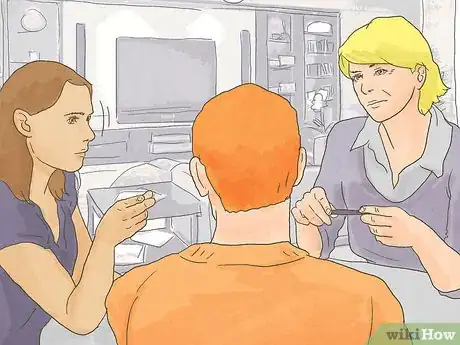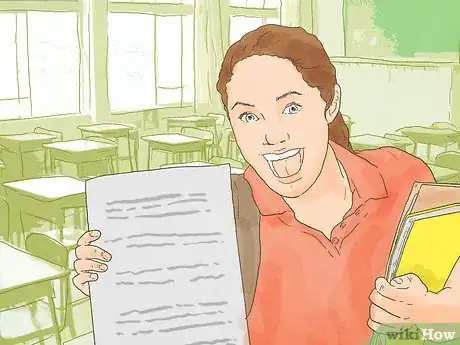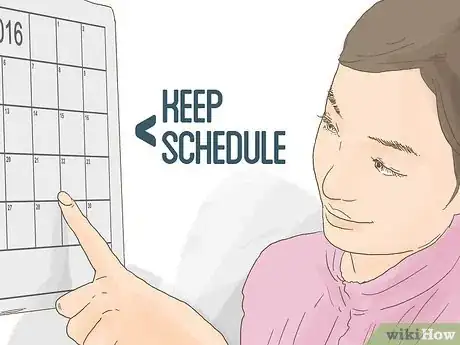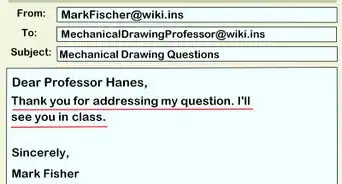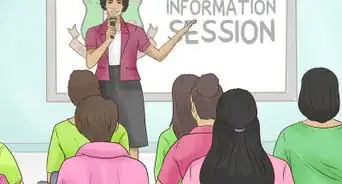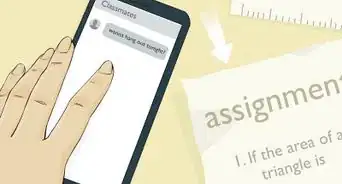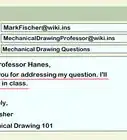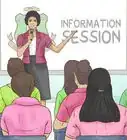This article was co-authored by Trudi Griffin, LPC, MS. Trudi Griffin is a Licensed Professional Counselor in Wisconsin specializing in Addictions and Mental Health. She provides therapy to people who struggle with addictions, mental health, and trauma in community health settings and private practice. She received her MS in Clinical Mental Health Counseling from Marquette University in 2011.
There are 10 references cited in this article, which can be found at the bottom of the page.
This article has been viewed 19,060 times.
School is often difficult for students, no matter if they are in elementary school or college. Facing academic challenges can make school an even worse experience. Academic performance may lead to serious issues, like extreme anxiety, or it may come from needing help with disabilities, like ADHD, autism, or learning disabilities. If you are facing academic challenging, try using counseling to overcome these challenges and improve your overall performance.
Steps
Using CBT to Overcome Academic Challenges
-
1Use cognitive behavioral therapy for test anxiety. Test anxiety is a very serious academic challenge. For those with test anxiety, it may not matter how much they study, the anxiety of taking the test will interfere with their performance. This can lead to failing or a low score. Cognitive behavioral therapy can help with test anxiety.
- Part of CBT is challenging negative thoughts. During counseling, you will learn how to identify negative and damaging thoughts that you have about exams. Then you will work on modifying those thoughts.
- For example, you may think, “I am going to fail this test.” Through counseling, you will learn how to replace that negative thought. You may eventually be able to say, “I feel like I’m going to fail. Feeling is an emotion, not a fact. I am not guaranteed to fail. A fact is that I studied for this test.”[1]
-
2Undergo psychotherapy. Psychotherapy can be used for any academic challenge you are facing. Psychotherapy is therapy or other treatment given by a mental health profession. Talk therapy may be helpful for any of your academic challenges, such as test anxiety, social anxiety, depression, or learning disabilities.[2]
- Using talk therapy allows you a safe, supportive environment to talk about your academic challenges. You can confront your feelings and work through them.
- Since test anxiety is a real problem that stems from a specific kind of anxiety disorder, psychotherapy may be helpful. You may learn to identify any underlying reasons why you have test anxiety.
- Psychotherapy may be helpful if you have behavior issues, anger issues, or feelings of isolation or depression due to a learning disability or mental condition.
- Go see a professional therapist or you can talk to a counselor found through your school.
Advertisement -
3Try CBT for classroom anxiety. You may have social anxiety that causes you to feel uncomfortable talking in class. You may feel like everyone is going to think you are stupid, or that your teacher will tell you you are wrong. You may just feel horribly embarrassed. In counseling, your therapist can teach you cognitive behavioral therapy strategies to deal with this anxiety.[3]
- Through CBT, you will learn how to recognize your irrational thoughts and learn how to challenge them and replace them with positive or healthy thoughts.
- For example, you may be afraid to speak in class because you think everyone will think you are an idiot. With CBT, you will learn how to challenge that thought by asking yourself, “Am I a mind reader? Can I tell the future? No. So, I cannot know if they will think I’m stupid.” You may ask yourself, “What is the worst thing that will happen if I say the wrong answer? The teacher will correct me, and I will continue listening in class. No one will laugh at me because no one laughs when other students get answers wrong.”[4]
-
4Try group counseling. Group counseling is a treatment technique where you go through a therapy session with other people who have a similar issue as you. The session is facilitated by a trained mental health professional. Group counseling gives you a safe place to discuss your problems and meet others who have similar issues as you.[5]
- You can learn from others as they discuss how they have faced or overcome obstacles. You can also gain support from them or offer support since you are going through similar things.
- You can go to group counseling for many different issues, such as social anxiety disorder, obsessive compulsive disorder, ADHD, and anxiety, among others.
Using Counseling for Disorders that Affect Academics
-
1Undergo counseling to determine the source of academic problems. Sometimes, there is an underlying reason why you are having academic difficulties. It may due to a condition like ADHD, autism, or OCD, or it may be due to a learning disability. Counseling can help you determine any problems you have so you can learn how to overcome them.
- For example, counseling may be able to help you identify if you have dyslexia or memory difficulties. Then, through counseling, you can learn specific skills about how to cope with your problem and how to be successful in school.
-
2Try counseling if you have behavioral problems. If your academic performance is suffering because of your classroom behavior, counseling may be able to help you. There might be an underlying mental condition, such as OCD, ADHD, or autism, that is affecting your behavior. If you are angry about something or act out for attention, you can talk through your feelings in counseling.[6]
- You can use talk therapy to identify and explore your feelings. You may be able to uncover why you feel the need to act out. If there is a reason behind it, such as feelings of anger or loneliness, the counselor can help you learn to cope.
- If you have a behavior disorder, the counselor can help you learn how to manage the disorder.
- Using CBT may be helpful in changing your negative classroom behavior.[7]
-
3Undergo speech counseling. Approximately one fourth of students suffer from speech and language disorders. If you have a speech and language disorder, you may have trouble speaking in class or to teachers and peers, you may struggle to understand or process information, and you make struggle when reading. Receiving counseling from a specialist can help you learn how to overcome your disorder so you can perform better in school.[8]
- Counseling will involve cognitive reorganization, memory retraining, language enhancement, and improvement of abstract thinking skills.
Getting the Most Out of Your Counseling Sessions
-
1Find a counselor who works for you. It is important to find a therapist who is equipped to deal with your situation and who you feel like you can trust. Therefore, you may need to talk to a few different therapists before you find one who really works for you. The most important thing is to find a therapist who makes you feel comfortable, so pay attention to how the therapist makes you feel.[9]
- If you are in high school, check with your school counselor. You may be able to meet with your school counselor on a regular basis or your school counselor may be able to refer you to someone who has experience helping students to overcome academic challenges.
- If you are in college, contact the counseling center at your university. Most universities have counseling centers that employ trained and licensed mental health professionals. Many schools include access to counseling services as part of a “Student Service Fee” that is charged to all students, which may entitle you to a certain number of sessions.[10] When you call, ask about counselors who have experience helping students with academic challenges.
-
2Set realistic expectations. Although counseling may result in significant improvement in your academic performance, you may not go from earning all C's and D's to earning straight A's. It is more likely that your improvement will be subtle and gradual.
- For example, after a few months of counseling, you may notice that your GPA has risen from a 2.4 to a 2.7. Or, you might notice that after using some of the strategies your counselor has taught you, you improved your math quiz score average from 60% to 80%.
- You might also notice little things, such as being able to retain more of the information that you read or hear in class, or feeling less overwhelmed by your schoolwork.
- Keep in mind that counseling takes time to take effect. While using the strategies that you learn in your counseling sessions may provide some immediate benefits, you may not see the effects of these strategies for a few months. Try to be patient as you continue to attend counseling and use the strategies that you learn.[11]
-
3Schedule and keep regular appointments. Maintaining a regular counseling schedule is essential for continued growth. Make sure that you schedule and keep your counseling appointments. Do not stop going because you feel better or because you think it is not working.
- Remember that it is important to be consistent with your therapy and follow through with the process so that you can achieve your academic goals.
- If you find yourself wanting to skip a session or stop going altogether, consider your reasons. Did your last session make you feel upset? Are you worried about what you might have to talk about next? Try to figure out the reason you want to skip or quit and tell your therapist about it.[12]
-
4Complete any assignments in between your sessions. Some types of therapy require you to do some work outside of the counselor’s office to work on changing certain thoughts and behaviors. These assignments can help you to develop new thoughts and behaviors that can help you to overcome your academic challenges. Your therapist cannot do this work for you, so it is up to you to make sure that you complete any assignments.[13]
- If your therapist gives you an assignment to complete before your next session, then make sure that you complete the assignment. The assignment might be a writing exercise, a self-affirmation, or something else to help you become more aware of your thoughts and behaviors.
Learning Skills to Improve Your Academic Performance
-
1Learn relaxation techniques. Relaxation technique may help you work through academic challenges. Whether it is test anxiety, social anxiety, an inability to focus, or something else, relaxing and reducing your stress can help refocus your brain. Having a clear brain can help you perform better academically. A counselor can help teach you stress relieving techniques that you can do at school or at home to prepare for school.[14]
- Relaxation techniques that you may learn in counseling includes deep breathing, progressive muscle relaxation, guided imagery and visualization, and meditation.
- For example, guided imagery is a technique where you visualize yourself in a non-stressful place. This helps you calm. You can also use guided imagery to help you visualize positive outcomes and success.
-
2Practice positive self-talk. Another thing you may learn in counseling is how to overcome damaging and negative self-talk. These statements are the ones where you mentally put yourself down, calling yourself stupid or something similar. Through counseling, you can learn how to stop using this abusive language with yourself and instead use positive self-talk.[15]
- For example, you may tell yourself often, “You are so stupid.” Instead of this kind of damaging self-talk, your counselor will help you learn how to be less critical and nicer to yourself. You will learn how to change that phrase into something like, “You are not stupid. You studied and you will pass this class” or “You have a learning disability, but that doesn’t mean you are stupid. Your brain is different, and that is okay. You are still smart, and you can do this.”
-
3Learn effective study skills. One thing you can learn through counseling to help with your academic challenges is effective study skills. A lack of study skills may lead to poor academic performance, lowered self-esteem, and feelings of inferiority. By getting help with your study skills, you can work to improve your grades and performance.[16]
- Many school counselors will help teach you study skills. It doesn’t matter if you are in middle school, high school, or college.
- You may be able to get information about good study skills in one counseling session, or you might meet with a school counselor multiple times to discuss your progress.
References
- ↑ https://www.anxietycanada.com/sites/default/files/Test_Anxiety_Booklet.pdf
- ↑ http://www.mayoclinic.org/diseases-conditions/generalized-anxiety-disorder/expert-answers/test-anxiety/faq-20058195
- ↑ http://www.ojjdp.gov/mpg/litreviews/Cognitive_Behavioral_Treatment.pdf
- ↑ https://www.anxietycanada.com/sites/default/files/Test_Anxiety_Booklet.pdf
- ↑ http://www.useoul.edu/students/counseling
- ↑ http://www.priory.com/psych/CBTchildhood.htm
- ↑ http://www.ojjdp.gov/mpg/litreviews/Cognitive_Behavioral_Treatment.pdf
- ↑ https://www.einstein.yu.edu/education/student-affairs/academic-support-counseling/medical-school-challenges/test-anxiety.aspx
- ↑ http://www.helpguide.org/articles/emotional-health/finding-a-therapist-who-can-help-you-heal.htm
- ↑ https://caps.tamu.edu/
- ↑ http://www.helpguide.org/articles/emotional-health/finding-a-therapist-who-can-help-you-heal.htm
- ↑ http://www.helpguide.org/articles/emotional-health/finding-a-therapist-who-can-help-you-heal.htm
- ↑ http://www.helpguide.org/articles/emotional-health/finding-a-therapist-who-can-help-you-heal.htm
- ↑ http://www.mayoclinic.org/diseases-conditions/generalized-anxiety-disorder/expert-answers/test-anxiety/faq-20058195
- ↑ https://www.anxietycanada.com/sites/default/files/Test_Anxiety_Booklet.pdf
- ↑ http://www.sdsmt.edu/Campus-Life/Student-Support/Counseling/Academic-Problems-and-Skills/

